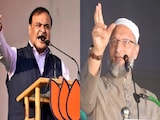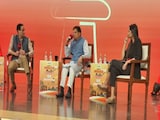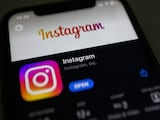- Group Captain Shubhanshu Shukla was India's first astronaut to visit the ISS on Axiom-4 mission
- Shukla thanked the Indian government, ISRO, and researchers for supporting the space mission
- ISRO Chairman noted missions from 2015-2025 nearly doubled those from 2005-2015
Group Captain Shubhanshu Shukla, India's first astronaut to visit the International Space Station as part of the Axiom-4 mission, described his journey as a mission for the entire nation.
During a joint press briefing with ISRO Chairman Dr. V. Narayanan, reflecting on the experience, Mr Shukla said spaceflight was different from ground training, and expressed gratitude to the Indian government, ISRO, and researchers for making the mission possible.
Mr Shukla during the briefing said, "It was entire nation's mission. The experience is very different from what you learn on ground. It was an unbelievable experience."
He further said, "Want to thank the Indian Government, ISRO, the researchers."
Subhanshu also detailed his extensive training and said, “My profile in this mission was the mission pilot. There are four seats in the Crew Dragon. I was the mission pilot and I had to work with the commander and interact with the systems of the Crew Dragon. We had to perform the experiments that were conceived, developed and realised by the Indian researchers. And also to perform STEM demonstrations, capture photos and videographs."
He added, "Grateful for people's support. The first few days in space were tough. Re-adjusting to gravity was a challenge."
Mr Shukla also hoped that someone would very soon travel to space "from our own capsule, from our rocket, from our soil".
He also said India looks "saare jahaan se achcha (better than the entire world)" even today -- words first used by Indian astronaut Rakesh Sharma after his space mission in 1984.
On his Axiom-4 Mission, Mr Shukla said the experience from the ISS mission would be very useful for India's own Gaganyaan mission, and he learnt a lot in the past year as part of his mission.
"No matter how much training you have done, even after that, when you sit in the rocket and the engines ignite, when they catch fire, I think it is a very different feeling. I had not imagined how it would feel, and I was actually running behind the rocket for the first few seconds, and it took me some time to catch up to it. From that moment until the time we splashed down, the experience was unbelievable. It was so exciting and so amazing that I have really been struggling to find words to convey it to you, so that you can live that experience through my words," he said.
At the press conference, Union Minister Jitendra Singh said the Department of Space has been around for nearly 70 years, and officially, the ISRO was established in 1969.
".... why all this had to happen only in the last few years, why it couldn't have happened in the last five, six decades. We have started following the strategies which are followed by the rest of the world. Now, our benchmarks are global benchmarks, our strategies are global, and the parameters that we are seeking to live up to are global," he said.
Meanwhile, Dr. Narayanan reflected on a decade of advancements, noting that ISRO's missions from 2015 to 2025 have nearly doubled those completed between 2005 and 2015. He emphasised the significance of recent achievements, including the successful completion of three key missions in the past six months.
Addressing the briefing, ISRO Chairman said, "In the last 10 years, the progress has been phenomenal and exponential. The missions completed from 2015 to 2025 are almost double those from 2005 to 2015. During the last 6 months, three important missions have been accomplished. The Axiom-4 mission is a prestigious mission. The first Indian was taken to the International Space Station and was brought back safely, Shubhanshu Shukla."
He added, "After PM Modi took over as the prime minister, the south asian satellite was built, launched and donated to the south asian countries. Under his leadership, we have also realised the G20 satellite for the G20 countries. 10 years ago, we had only one startup company in the space area. Today, we have more than 300 startups in the space industry. There are two suborbital missions done by private companies."
Earlier in the day, Shubhanshu Shukla met Defence Minister Rajnath Singh in Delhi after a successful mission to the International Space Station (ISS).
Earlier on Monday, Mr Shukla also met Prime Minister Narendra Modi. Mr Shukla was the pilot of the Axiom-4 Space Mission to the ISS. He returned to Earth on July 15 after completing the NASA mission and landed in the national capital in the early hours of Sunday.
Lok Sabha speaker Om Birla on Monday highlighted the importance of Shubhanshu Shukla's achievements in completing a mission aboard the International Space Station (ISS) and the critical role of the space program for the 'Viksit Bharat' by 2047.
"On this occasion, the (lower) house welcomes Air Force Group Captain Shubhanshu Shukla to India. His space mission and successful return are not merely about the success of the mission, but a matter of pride and inspiration for Indian citizens. Shukla's achievement is an inspiration for the youth," Birla had said while addressing the Lok Sabha.
Lok Sabha on Monday briefly took up discussion on India's First Astronaut Aboard the International Space Station - Critical Role of Space programme for 'Viksit Bharat By 2047'. Speaker Om Birla congratulated Group Captain Shubhanshu Shukla for his achievements.
(With inputs from PTI)















